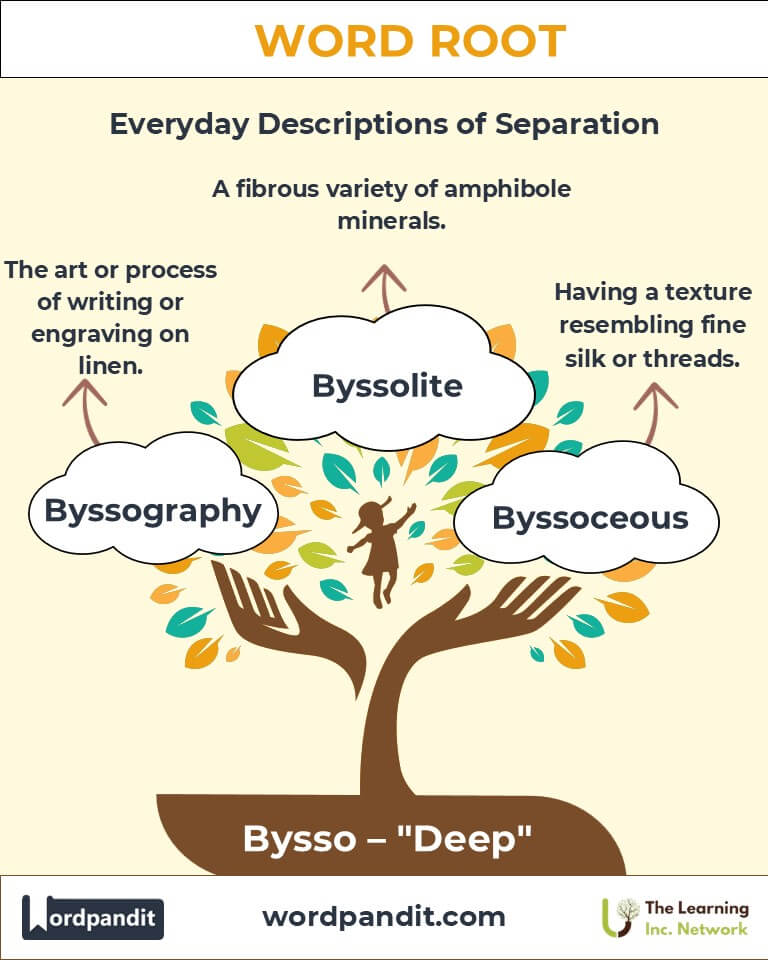Bysso: Exploring the Depths of Language and Science
Dive into the fascinating world of the word root "bysso," a term of Greek origin meaning "deep." From its use in biology to its subtle presence in language, this root reveals the profound layers of meaning and mystery underlying words like "byssus" and "byssiferous."
Table of Contents
- Introduction: The Essence of Bysso
- Etymology and Historical Journey
- Mnemonic: Unlocking the Power of Bysso
- Common Bysso-Related Terms
- Bysso Through Time
- Bysso in Specialized Fields
- Illustrative Story: Bysso in Action
- Cultural Significance of the Bysso Root
- The Bysso Family Tree
- FAQs about the Bysso Word Root
- Test Your Knowledge: Bysso Mastery Quiz
- Conclusion: The Living Legacy of Bysso
1. Introduction: The Essence of Bysso
The root "bysso" captures a sense of depth, both literal and metaphorical. Derived from the Greek "byssos," meaning "depth" or "abyss," it forms the basis of words that connect to hidden, profound layers. Whether describing the fine fibers spun by mollusks or diving into philosophical depths, "bysso" speaks to the richness of the unseen.

2. Etymology and Historical Journey
The term "bysso" originates from the ancient Greek word βύσσος (byssos), meaning "bottom" or "depth." In classical literature, it was often used to describe the ocean's unfathomable reaches. Over time, the term evolved in biology to denote the silky threads produced by mollusks, like mussels, to anchor themselves to surfaces, symbolizing both connection and hidden strength.
3. Mnemonic: Unlocking the Power of Bysso
Imagine descending into the depths of the ocean, where a delicate network of silken threads holds mussels firmly to the seafloor. This imagery connects the idea of depth ("bysso") with resilience and connection.
Mnemonic Device: "Bysso binds the depths with delicate threads."
4. Common Bysso-Related Terms
- Byssus (BIS-sus):
Definition: The silky filaments secreted by certain mollusks to anchor themselves.
Example: "The mussel's byssus threads clung tightly to the rocky surface." - Byssiferous (bis-SIF-er-us):
Definition: Bearing or producing byssus.
Example: "Byssiferous mollusks like mussels thrive in intertidal zones."
5. Bysso Through Time
- Classical Literature: In ancient texts, "byssos" often referred to deep waters or metaphorical depths.
- Biology: In the 17th century, naturalists began using "byssus" to describe the anchoring threads of mollusks.
- Modern Use: Today, "byssus" represents both a biological marvel and a metaphor for unseen strength and stability.
6. Bysso in Specialized Fields
- Marine Biology:
Byssus: Essential for studying mollusk behavior and ecological adaptations. - Materials Science:
Byssal Threads: Inspiring research into bioadhesives and synthetic fibers. - Literature:
Depth as a Theme: The root inspires imagery of profound thought or hidden mysteries in poetry and prose.
7. Illustrative Story: Bysso in Action
In a quiet bay, a marine biologist named Ella studied the byssus of mussels. These delicate yet robust threads fascinated her as a natural solution to creating eco-friendly adhesives. Inspired by the strength of these tiny anchors, Ella developed a biodegradable material that revolutionized surgical sutures, showcasing the power of "bysso" in bridging the natural and technological worlds.
8. Cultural Significance of the Bysso Root
The root "bysso" represents depth, whether physical or metaphorical. Its connection to marine life emphasizes resilience and adaptability, while its historical usage evokes mystery and exploration. Across cultures, the imagery of threads binding to the deep resonates with themes of connection, stability, and survival.

9. The Bysso Family Tree
- Abyss (Greek: "a" = without, "bysso" = depth):
Meaning: A bottomless chasm or profound depth.
Example: "The abyss of space inspires awe and wonder." - Byssinosis (Greek "bysso" + "osis" = condition):
Meaning: A lung disease caused by inhaling cotton or flax fibers.
Example: "Factory workers were at risk of developing byssinosis." - Abyssal (from "abyss"):
Meaning: Pertaining to the ocean's depths.
Example: "The abyssal zone harbors some of the planet's most unique species."
10.FAQs About the Bysso Word Root
Q: What does "bysso" mean?
A: "Bysso" originates from the Greek word "byssos," meaning "depth" or "bottom." It is used in contexts describing profound or hidden layers, like the ocean's depths or the fine threads produced by mollusks.
Q: What is a byssus?
A: A byssus refers to the silky filaments produced by mollusks, such as mussels, to anchor themselves to surfaces. These threads are strong and flexible, inspiring research into bioadhesives.
Q: What does "bysso" represent metaphorically?
A: Metaphorically, "bysso" symbolizes depth, strength, and unseen connections. It reflects hidden resilience or profound thought, much like the anchoring threads of mollusks in the depths.
Q: What is byssinosis?
A: Byssinosis is a respiratory disease caused by inhaling fibers like cotton or flax. While the term shares the "bysso" root, it highlights the idea of fine particles penetrating deep into the lungs.
Q: How is the byssus used in science or technology?
A: Byssal threads inspire research in bioadhesives and underwater glues. Their ability to adhere in wet environments is being studied for applications like medical sutures and eco-friendly materials.
11. Test Your Knowledge: Bysso Word Root Quiz
1. What does the root "bysso" signify?
2. What are byssal threads?
3. Which term refers to "bottomless depths"?
4. What is byssinosis?
5. Byssal threads are most commonly associated with:

12. Conclusion: The Living Legacy of Bysso
The root "bysso" reveals the profound and enduring connection between language, nature, and human ingenuity. Whether anchoring a mussel or inspiring new materials, its legacy reminds us of the power within the unseen. Explore the depths of "bysso" in your own discoveries, and let its threads of meaning weave into your understanding of the world.











